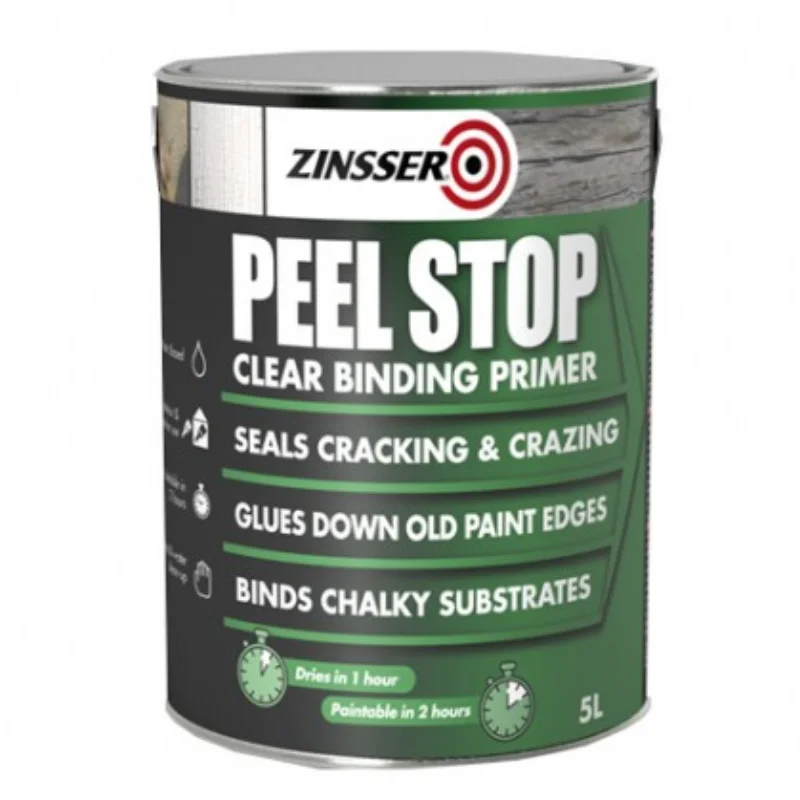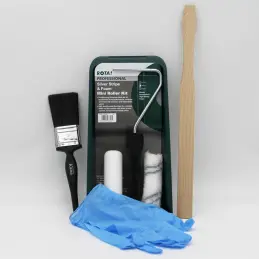- There are no more items in your cart
- Shipping Calculated at checkout
-
Sub-Total (inc. VAT)
£0.00
- A clear flexible binding primer designed to seal and prevent peeling.
- Suitable for use on both interior and exterior surfaces including wood, metal, masonry, and more.
- Glues down edges of old paint and bridges cracks to provide a sound surface for topcoats.
- Binds chalky surfaces, preventing future peeling and ensuring a durable finish.
- Fast-drying formula allows for recoating in just 2 hours.
- Easy cleanup with soap and water.
Zinsser Peel Stop - Unique Clear, Water-Based Binding Primer
Stops peeling, cracking, and flaking on a variety of surfaces. Its flexible formula seeps into tiny cracks and gaps under the edges of old paint, forming a tight bond that prevents future peeling and ensures a smooth finish for your topcoat applications.
Application Areas
- Exterior Surfaces: Ideal for use on previously painted wood siding, windows, doors, fences, metal gutters, masonry walls, and foundations.
- Interior Surfaces: Suitable for previously painted drywall, plaster, cement, concrete, stucco walls, ceilings, wood doors, windows, baseboards, and trim.
How to Use
Proper surface preparation is crucial for the best results. Ensure that surfaces are clean, dry, and free from dust, dirt, grime, grease, oil, wax, mould, and any other contaminants that could affect adhesion. Thoroughly scrape and sand to remove all poorly adhered paint. Lightly sand exposed wood and dull glossy painted areas with sandpaper.
Apply with a brush, roller, or airless sprayer. Back brush or roll to work Peel Stop into cracks and edges of old paint. Typically, only one coat is necessary, but excessively porous surfaces may require a second coat.
Performance Characteristics
- Flexible and breathable to prevent cracking and peeling.
- Binds and seals chalky surfaces.
- Fast-drying; ready for recoating in 2 hours.
- Soap and water cleanup makes it easy to maintain application tools.
Limitations
Peel Stop is not intended as a substitute for proper surface preparation or for use on surfaces where paint failure results from chronic or excessive moisture intrusion. Repair any source of moisture before repainting. It is not suitable for use on floors, exterior decks, or surfaces subject to immersion or prolonged contact with water.
Safety Information
Consult the Safety Data Sheet (SDS) for detailed safety information. Peel Stop is classified as non-dangerous under Regulation (EC) No. 1272/2008. It contains a reaction mass of 5-chloro-2-methyl-4-isothiazolin-3-one and 2-methyl-2H-isothiazol-3-one (3:1), which may cause an allergic reaction. Ensure proper ventilation during application and avoid contact with skin and eyes.
Zinsser Peel Stop is classified as non-hazardous and not regulated under ADR/RID, IMDG, or IATA. It does not contain Diisocyanates. Always dispose of contents and container in accordance with local regulations.
Data sheet
- Manufacturer
- Zinsser
- For Use By
- Consumer Use
- Interior / Exterior Use
- Interior & Exterior
- Water / Solvent Based
- Water
- For Use On
- Masonry
Wood
Metal
Concrete
Stucco
Brickwork
Vinyl
Drywall
Plaster
Cement - Application Method
- Brush
Roller
Airless Spray - Colour
- Clear
- VOC Levels
- Ultra-Low (5-49 g/l)
- Pack Size
- 1L
2.5L
5L - Coverage
- 7.4-9.8m² per litre
- Solids by Volume
- 19.30%
- Shelf Life (from date of manufacture)
- 2 years
- Touch Dry
- 1 Hour
- UN Number
- N/A
- Dry to Recoat
- 2 hours
- Fully Cured
- 7 to 10 days
- Viscosity
- 58 - 65 KU
- Solids by Weight
- 21.60%
- Base Type
- Water-Based
- Suitable For Use On
- Masonry
- Suitable For Use On
- Concrete
- Suitable For Use On
- Stucco
- Suitable For Use On
- Wood
- Suitable For Use On
- Plaster
- Suitable For Use On
- Cement
- Suitable For Use On
- Doors
- Application Method
- Brush
- Application Method
- Roller
- Application Method
- Airless Spray
- Manufacturer
- Zinsser
- Components
- 1K
- Usages
- Problem Surfaces
- Usages
- Crack Bridging
- Product Usage Type
- Primer
- Fastest Delivery
- Next Working Day
- Colour Family
- Clear
- Product Attributes
- Problem Surface
Questions
Question about the product
|
| Question:
I have painted paneling with interior primer, satin. With any scratch the paint peels off the walls. Can I paint this as an over coat to keep it from peeling? |
Answer from Rawlins’ Technical Team:
Unfortunately no this would not be suitable for this application. The best cause of action would be to removed the loose and flaking paint, prepare the area making sure it is clean, dry and sound then reapply a suitable paint system. | |
|
| Question:
Hi Have given a ceiling one coat of emulsion but some patches look like the skin of an orange. If I sand down is peel stop ok to be applied over emulsion paint? Ian Thanks |
Answer from Rawlins’ Technical Team:
This product can be applied over previously painted substrates, but is not suitable for this application. It is designed to seal small cracks or gaps through the paint and not to level an uneven finish. | |
|
| Question:
Hi, I have stripped wallpaper and have flaking/peeling emulsion underneath. I’ve scraped/sanded most off but I’m thinking about coating all walls with Stop Peel to ensure a sound substrate for re-papering. Can I re-paper over Stop Peel or should I: Stop Peel, repaint then re-paper or, would you recommend an alternation preparation. Thank you. |
Answer from Rawlins’ Technical Team:
Peel Stop is designed for problem interior / exterior painted surfaces that exhibit chalking, alligatoring, cracking, flaking and peeling that are required to be overpainted not wall papered. We would recommend sanding the substrate back to remove any flaking material before applying wall paper. | |
|
| Question:
Hi, removed wallpaper from a room and then wiped it down with sugar soap. Once it was dried, I used Dulux Matt Emulsion Undercoat. However, two coats later the paint is cracking all over the room and looks like fine lines all over. It is not peeling but cracking. Would a layer of Peel Stop prevent cracking on a new coat of emulsion? Thanks. |
Answer from Rawlins’ Technical Team:
This sounds like excess paste residues, Zinsser Gardz is the only Zinsser product that can seal these in. Ideally you would apply this straight after removing the wallpaper before the Dulux emulsion. It might pay to do a test area with the Gardz over a painted section, let it cure overnight then try a coat of emulsion and see if the problem has been cured. The Gardz doesn’t fill the cracks but it does seal the paste allowing you to paint over. If the visual appearance of the cracks are an issue they will need to sand down the walls to a smooth finish first then apply the Gardz. (Zinsser Peel Stop will not work). | |
|
| Question:
Hi, I had a bad experience today whilst painting a room, the roller was pulling the freshly applied paint off the wall, I managed to get it on in the end but had to go round after patching up, this is the first coat and it looks like the second coat will go on successfully as I have painted a test area when paint was dry. However I did some research this evening and found the problem to be that I was painting Dulux Easycare matt over a previously painted silk vinyl wall. I am now aware of the issue. My question is that if the Easycare paint cracks can I use Zinsser peal stop to coat the walls and then apply another coat of Dulux Easy care. Thanks for your help. Kind Regards Mr Gordon Gill |
Answer from Rawlins’ Technical Team:
If the Easycare starts to crack or craze you would need to sand the surface back to a sound substrate then apply Zinsser Peel Stop. It won’t bind down poorly adhering paint. If you had primed first with Zinsser Bulls Eye 1-2-3 this would have prevented the problem from occurring. | |
|
| Question:
Can I use peel stop on walls with exposed plaster and peeling paint work? |
Answer from Rawlins’ Technical Team:
Zinsser Peel Stop is suitable for previously painted drywall, plaster, cement, concrete, or stucco walls and ceilings; wood doors, windows, baseboards and trim. | |
|
| Question:
Hi, I have a problem with cracking flaking paint in my kitchen. I have scraped off the flakey paint and sanded over but it now needs to be filled, should I fill first then coat with peel stop? Also, the flaking is in patches on the walls, should I paint all ofnthe walls or just the problem areas? Any advice would be greatly received! Thanks |
Answer from Rawlins’ Technical Team:
Zinsser Peel Stop may be applied to seal the edges of the paint once they have been brought to a sound feathered edge. This product will not soak through the paint, so only the edges need to be painted, following which a primer and decorative top coat may be applied once dry, 2 hours in normal drying conditions. The Peel Stop can be applied after the required areas have been filled. | |
|
| Question:
Can I use Zinsser Peel Stop as a stabiliser before applying Sandtex Masonry Paint? I've scraped off bubbling paint etc but I am concerned about stopping paint edges peeling and chalky patches. |
Answer from Rawlins’ Technical Team:
Yes absolutely, Zinsser Peel Stop can be overcoated with most types of paint so any water based or solvent based Sandtex Paint will be fine. | |
IMPORTANT SHIPPING & DELIVERY INFORMATION
Zinsser Peel Stop is only available with the shipping and delivery timescales listed below - please do not contact our Customer Support Team with enquiries about alternative or earlier shipping and delivery times.
Saturdays and Sundays, as well as Bank Holidays, are not classed as working days.
Orders placed after the cut-off for this product will not be processed for earliest dispatch until 9am the next working day.
All delivery costs below are excluding VAT



